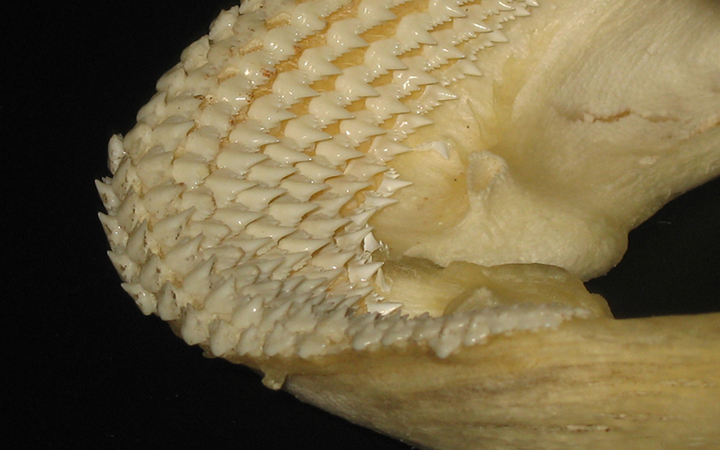Hand-Feeding Sharks Is a Terrible Idea

A woman who tried to hand-feed a shark is lucky she still has a hand. Yes, it bit her. IT'S A SHARK.
Melissa Brunning of Perth, Australia, was on a holiday yacht cruise in Dugong Bay on Australia's coast, when four tawny nurse sharks (Nebrius ferrugineus) swam close to the back of the boat, Perth Now reported. Several of Brunning's companions dropped fish in the water near the sharks, one of which measured almost 7 feet (2 meters) in length.
However, when it was Brunning's turn, she tried to feed the shark directly by hand. As the shark snatched the food, its jaws closed on her finger, and it yanked her into the water — a terrifying moment that one of her friends captured on video, according to Perth Now. [Images: Sharks & Whales from Above]
In the footage, which was shared on Twitter by Australia's 7 News Melbourne on July 1, Brunning is seen bending toward the water, food in hand, as a nurse shark swims by. As it comes nearer, she puts her hand down into the water next to its head — and then screams as the shark bites down on her finger and pulls her in.
"It happened so quickly," Brunning told 7 News Melbourne, and the pain was so excruciating that she initially thought her finger had been bitten off completely.
"It felt like it was shredding off the bone," she said. "I couldn't even look at the finger because I thought it was gone."
But after the shark released Brunning's finger, she found that it was still very much attached to her hand, though severely lacerated. Because the location where she was on holiday was so remote, she didn't seek treatment until nearly two weeks later, by which time her finger was badly infected, and X-rays revealed that she had suffered a torn ligament and a bone fracture, according to 7 News Melbourne.
Sign up for the Live Science daily newsletter now
Get the world’s most fascinating discoveries delivered straight to your inbox.
Tawny nurse sharks, also known as spitting sharks and sleepy sharks, are found in coastal waters spanning from east to west along Australia's northern coast. They are "relatively stout" sharks with blunt snouts holding rows of sharp teeth, and they can grow to be as long as 10.5 feet (3.2 m), representatives of the Queensland Department of Agriculture and Fisheries wrote in a species description.
The accident was unquestionably harrowing, but labeling it a "shark attack," as 7 News Melbourne did, is misleading, as Brunning literally put a handful of food — and her hand — into the shark's mouth voluntarily; the animal simply reacted as it normally would in the presence of food, ecologist and shark researcher David Shiffman, a research fellow at Simon Fraser University in British Columbia, Canada, wrote in a tweet on July 2.
At least Brunning acknowledged her responsibility for the incident, adamantly affirming that it was entirely her fault, that the shark was blameless and that she was very, very lucky that her injury wasn't "a lot worse," she told Perth Now.
Brunning said her future interactions with marine wildlife will be better informed thanks to her harrowing experience, as she intends to "respect marine life, and look at it in awe, but just leave them alone," Perth Now reported.
Original article on Live Science.

Mindy Weisberger is an editor at Scholastic and a former Live Science channel editor and senior writer. She has reported on general science, covering climate change, paleontology, biology and space. Mindy studied film at Columbia University; prior to Live Science she produced, wrote and directed media for the American Museum of Natural History in New York City. Her videos about dinosaurs, astrophysics, biodiversity and evolution appear in museums and science centers worldwide, earning awards such as the CINE Golden Eagle and the Communicator Award of Excellence. Her writing has also appeared in Scientific American, The Washington Post and How It Works Magazine. Her book "Rise of the Zombie Bugs: The Surprising Science of Parasitic Mind Control" will be published in spring 2025 by Johns Hopkins University Press.










